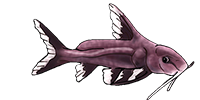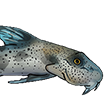Megalechis thoracata failure to thrive?
-
characinfan
- Posts: 29
- Joined: 02 Mar 2013, 16:18
- My cats species list: 1 (i:1, k:0)
- My aquaria list: 1 (i:1)
- Spotted: 1
- Location 2: Canada
 Megalechis thoracata failure to thrive?
Megalechis thoracata failure to thrive?
Hi there,
I have two Megalechis thoracata. They've been with me almost a year. About 3 months ago, I separated out the smaller of the two from the main tank and put it into quarantine because it was not growing. I suspected that the larger of the two (who matured into a male) was hogging the food. There didn't seem to be any bullying or other issues going on with the other fish, just that the larger M. thoracata had grown to such a size that he could suck down pellets and worms whole instead of having to chew them, leaving less for the smaller guy. The larger catfish is thriving and living peacefully with my two headstanders.
So I put the little guy into a 10 g quarantine tank with water and filter fibres from the original tank and a piece of wood from the original tank for a hiding space.
3 months on, not only has the fish failed to grow, but now it's showing no interest in food and has begun to develop shredded fins. I've been offering it shrimp pellets and sinking pellets (crushed to be of manageable size), bits of cooked fish when I cook fish, red wigglers from my compost bin, and even bits of carrot cake -- all things that the other fish love and that this fish would also eat, or try to eat, when it was in the other tank. But now even fresh worms writhing and landing on its head are completely ignored!
I'm not sure what to do. The fish is still acting normally (other than not eating) and hasn't seemed to lose any weight, but it is not growing and I'm concerned about the shredded fins. I've increased the frequency of water changes but I'm not sure what else to do. (The water parameters are all good anyways).
What do you suggest?
I have two Megalechis thoracata. They've been with me almost a year. About 3 months ago, I separated out the smaller of the two from the main tank and put it into quarantine because it was not growing. I suspected that the larger of the two (who matured into a male) was hogging the food. There didn't seem to be any bullying or other issues going on with the other fish, just that the larger M. thoracata had grown to such a size that he could suck down pellets and worms whole instead of having to chew them, leaving less for the smaller guy. The larger catfish is thriving and living peacefully with my two headstanders.
So I put the little guy into a 10 g quarantine tank with water and filter fibres from the original tank and a piece of wood from the original tank for a hiding space.
3 months on, not only has the fish failed to grow, but now it's showing no interest in food and has begun to develop shredded fins. I've been offering it shrimp pellets and sinking pellets (crushed to be of manageable size), bits of cooked fish when I cook fish, red wigglers from my compost bin, and even bits of carrot cake -- all things that the other fish love and that this fish would also eat, or try to eat, when it was in the other tank. But now even fresh worms writhing and landing on its head are completely ignored!
I'm not sure what to do. The fish is still acting normally (other than not eating) and hasn't seemed to lose any weight, but it is not growing and I'm concerned about the shredded fins. I've increased the frequency of water changes but I'm not sure what else to do. (The water parameters are all good anyways).
What do you suggest?
-
characinfan
- Posts: 29
- Joined: 02 Mar 2013, 16:18
- My cats species list: 1 (i:1, k:0)
- My aquaria list: 1 (i:1)
- Spotted: 1
- Location 2: Canada
Re: Megalechis thoracata failure to thrive?
Update: So far the fish has not improved. In fact, it is starting to look a little skinnier. I started adding Melafix (= tea tree oil solution, a mild antiseptic) to the water two days ago. A standard treatment lasts 7 days. I hope this little guy will pull through -- but, given the large number of views and lack of commentary from other forum members, I suspect that this fish is doomed.  Probably its illness is genetic.
Probably its illness is genetic.
-
characinfan
- Posts: 29
- Joined: 02 Mar 2013, 16:18
- My cats species list: 1 (i:1, k:0)
- My aquaria list: 1 (i:1)
- Spotted: 1
- Location 2: Canada
Re: Megalechis thoracata failure to thrive?
Hmm, thanks. Worth a try.
-
characinfan
- Posts: 29
- Joined: 02 Mar 2013, 16:18
- My cats species list: 1 (i:1, k:0)
- My aquaria list: 1 (i:1)
- Spotted: 1
- Location 2: Canada
Re: Megalechis thoracata failure to thrive?
Update:
I tried a week-long course of Melafix (basically tea tree oil). It did seem to treat the fin rot. The fish perked up but was not interested in eating -- live worms were neglected.
After about two weeks of no further improvement, I got annoyed and put the fish back in the main tank with the adult male M. thoracata (at least 4 times the size of the sick one) and 2 Abramites hypselonotus. Within days, the sad fish became more active, its stumpy fins started to grow back, and it regained its appetite. The adult male M. thoracata does not harass the little one at all and the headstanders ignore it.
The moral of the story seems to be that M. thoracata are inherently social and do best with other fish around, even if it means less food is available.
I tried a week-long course of Melafix (basically tea tree oil). It did seem to treat the fin rot. The fish perked up but was not interested in eating -- live worms were neglected.
After about two weeks of no further improvement, I got annoyed and put the fish back in the main tank with the adult male M. thoracata (at least 4 times the size of the sick one) and 2 Abramites hypselonotus. Within days, the sad fish became more active, its stumpy fins started to grow back, and it regained its appetite. The adult male M. thoracata does not harass the little one at all and the headstanders ignore it.
The moral of the story seems to be that M. thoracata are inherently social and do best with other fish around, even if it means less food is available.




